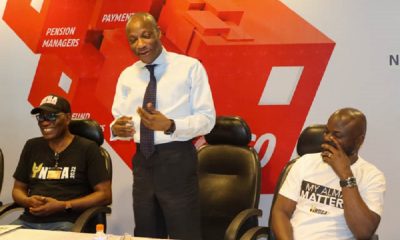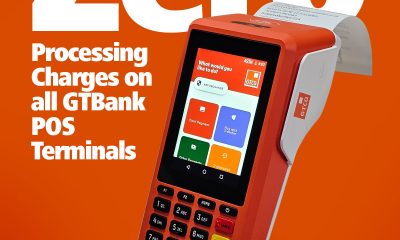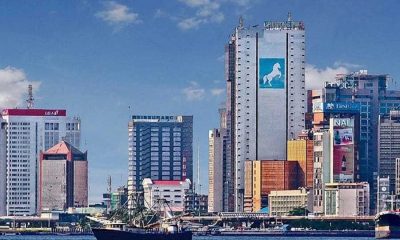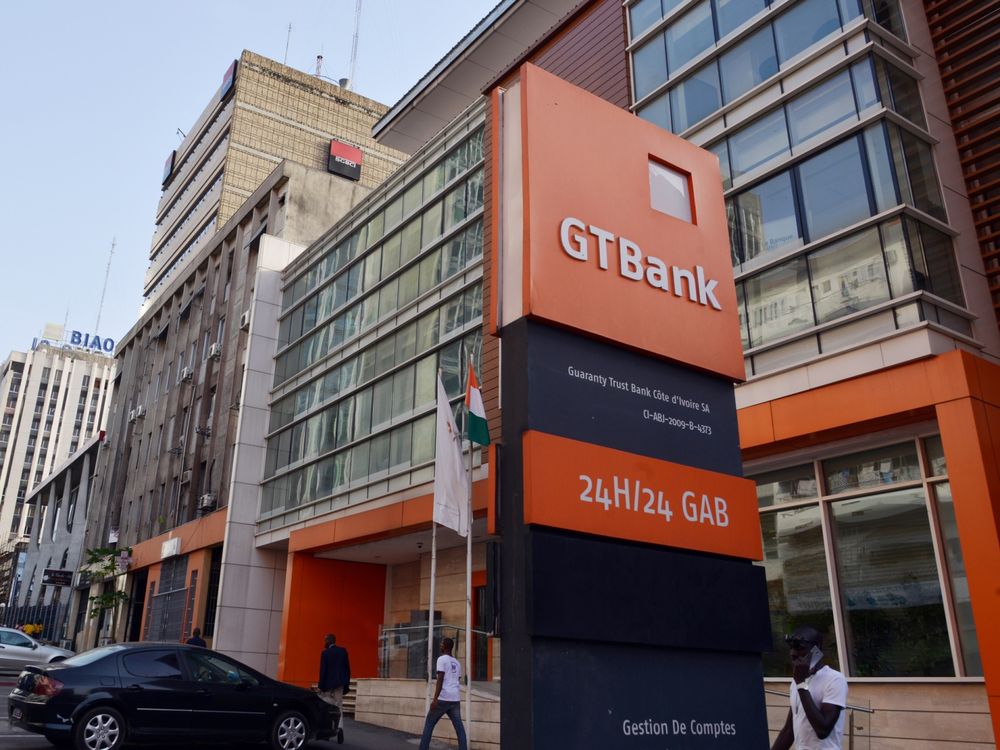Feature/OPED
Innoson, GTBank: The Bank Is Not Always The Villain
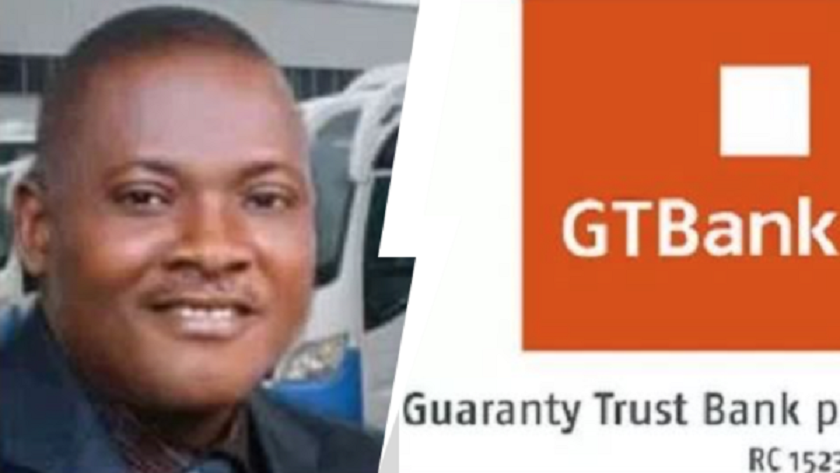
By Lukmon Akintola
A businessman who wants a loan is almost ready to do anything. He would grovel if the loan officer asks him to, he would bark like a dog if he needs to. However, the moment the loan is granted, he becomes egoistic and wants to cross all the ‘T’s and dot the ‘I’s of the contract.
This seems the story of the average Nigerian businessman who needs a loan for his business, but is just not ready to pay back, so he consciously or unconsciously schemes a way out.
Like a lazy young man being fed by his father, he begins to imagine that he could have gotten a better deal. He starts to ask himself how he didn’t see the loopholes in the contract forgetting that the so-called loopholes were the condition for granting the loan, and that he only got the loan because the bank offered it to him on their term, a term he gladly accepted.
With the number of bank/businessmen cases scattered in several courts all over Nigeria, one is forced to wonder if businessmen makeup their minds not to pay back loans obtained from banks. One is also forced to ask if these men obtaining the loans are aware that if they don’t pay back, others won’t get.
In most cases, businessmen tag the bank the villain, the bully and the thief. Tales of interest not properly calculated abound; gist of banks dragging their customers to court to recoup their monies is like a never ending story in Nigeria. But in all of the situations, businessmen and some soft brained individuals conclude that the bank is the one to be blamed.
Generally, businessmen seem to easily reach a quick concluded that the bank is always after their collateral and business. Shamefully, issues that are supposed to be sorted in court become a social media topic, a farce indeed.
One fact which can and should never be forgotten is that a man who borrows should know that he would on an agreed date payback his debt. This is the basic meaning of a loan, but it seems to elude some Nigerian businessmen.
This is not the story of GTBank and Innoson, no it is not. In fact, it is the tale of a seemingly endless trend being suffered by Nigerian banks in the hands of businessmen, who obtain loans that they don’t intend to pay back or are just too dull to manage profitably. Access Bank, Zenith Bank and several other banks have walked this path and the truth is that soon, banks might decide not to give out loans anymore, who will blame them?
The GTBank/Innoson legal battle is just another story of a loan granted with reluctance to pay back. Below is a basic analysis of what went wrong.
The Facts:
- GTBank (in 2009) granted Innoson several credit facilities (i.e loans) totalling N2,400,000,000,00 (two billion, four hundred million Naira only), to part finance working capital requirements, import new motorcycles and motorcycle spare parts, agricultural spare parts and plastic manufacturing equipment (“Imported Goods”).
- Under the loan terms agreed by Dr. Innocent Chukwuma on behalf of Innoson, proprietary interest in the Imported Goods was consigned exclusively in favour of the Bank. This means that the Bank was the exclusive owner of the Imported Goods. Accordingly, the original shipping documents (i.e. the Bills of Lading) were in the custody of the Bank, and have remained in the custody of the Bank at all times.
- Because GTBank was the exclusive owner of the imported goods, ownership of the goods could only be transferred to Innoson (or any other third party) by the Bank. The condition in the agreement between the Bank and Innoson, for the release of the Imported Goods by the Bank to Innoson, was the payment of 25% of the value of each Letter of Credit transaction by Innoson.
More Facts:
- Innocent Chukwuma approached the Bank, on behalf of Innoson, requesting the release of the shipping documents without payment of the agreed+ 25% equity. The Bank declined his request as a result of Innoson’s failure to meet the agreed conditions.
- It came to the Bank’s knowledge sometime in June, 2011 that the Imported Goods for which the Bank declined to release shipping documents to Innoson in view of its failure to meet the agreed conditions, had been fraudulently procured by Innoson.
- The Bank discovered that Innoson, under the control of Dr. Innocent Chukwuma, had forged the Bank’s endorsement on the bills of lading to the Shipping Line and fraudulently cleared the Imported Goods which were in the name of the Bank. The Imported Goods, being property of the Bank should not have been cleared from the Port without the original shipping documents being endorsed by the Bank in favour of Innoson, or any third party.
- The signatures of 4 (four) staff of the Bank, to wit, Taofeek Olalere, Dan Attah, Bunmi Adeyemi and Amazu Amalachukwu, as well as the Bank’s stamp were forged on all the shipping documents used by Innoson to fraudulently clear goods at the port. The Bank did not at any time endorse or transfer the shipping documents to Innoson, as the originals of each of the relevant Bill of Lading remain in the Bank’s custody to this very day.
- When the Bank reported the matter to the Nigeria Police, Dr. Innocent Chukwuma claimed the Bank released the shipping documents to him. Consequently, the Police commenced investigation into the Bank’s complaint, including a forensic examination of the disputed signatures, and established that the signatures of the Bank’s staff were forged, and the Imported Goods were fraudulently cleared from the Nigerian Ports Authority by Dr. Innocent Chukwuma and his accomplices.
The Police Angle:
- Police investigations confirmed that Innoson and Dr. Innocent Chukwuma deliberately set out to defraud, steal from the Bank and convert the Imported Goods belonging to the Bank by deceptive means and through forgery and misrepresentation. The unlawful takeover of the Imported Goods, which served as the Bank’s collateral, left an indebtedness in excess of the sum of N1,654,481,895.04 (one billion, six hundred and fifty four million, four hundred and eighty one thousand, eight hundred and ninety five Naira, four Kobo) as at September 26, 2012.
- Chief Innocent Chukwuma was arrested and interrogated by operatives of the EFCC, following which he agreed to make monthly payments into Innoson’s account until the full liquidation of Innoson’s indebtedness to the Bank. However, Innoson defaulted in making the agreed payments. Investigations by the Nigeria Police following a petition by the Bank in September 2013 also found Innoson and Chief Innocent Chukwuma culpable of the criminal allegations levied against them by the Bank, and Chief Innocent Chukwuma was accordingly charged to court by the Police.
- The Police filed Charge No. FHC/L/565C/2015-Inspector General Of Police And Innoson Nigeria Limited; Innocent Chukwuma;Charles Chukwuma;Maximian Chukwura; Mitsui Osk Lines; Annajekwu Sunny for fraudulent clearance of goods, forgery, conversion, stealing and conspiracy presently pending before Faji J, at the Federal High Court, Ikoyi and adjourned to November 21, 2017 for arraignment/or hearing of motion for issuance of Bench Warrant.
Innoson’s Angle:
- Innoson approached the Bank for a reconciliation of his account and pleaded for a debt forgiveness. A reconciliation was carried out on the account – which had a debit balance of N1,654,481,895.04 as at December 31, 2011. In the spirit of amicable resolution and EFCC intervention, the Bank said it agreed to forego the sum of N559,374,072.09 which represented default charges that has accrued on the account and debited in line with the loan agreement between the customer and the Bank.
- Based on this, the Bank decided to accept from the customer, the sum of N1,095,107,822.95 as full and final payment of the customer’s indebtedness to the Bank, provided that same shall be fully paid not later than (30) days from the date of the letter written to him
- Surprisingly, Innoson commenced suit no: FHC/AWK/CS/2012 against the Bank at the Federal High Court, Awka stating the bank had debited its account with excess charges totalling N559,374,072.09 and obtained judgement in excess of N4.7Billion against the Bank. Again, choosing to dishonour an agreement that was amicable reached between him and the Bank for a full and final settlement of N1,095,107,822.95 wherein the Bank graciously forgave him the sum of N559,374,072.09 which accrued on his account during the period which he abandoned his account.
- To further stall the criminal proceedings against him, Chief Innocent Chukwuma and his company instituted suits at the Federal High Court, Abuja, as well as the Federal High Court, Awka in January 2014 against The Inspector General of Police, The Nigeria Police Force and Investigating Officer(s), seeking declaratory and injunctive reliefs, including orders restraining the Police from commencing criminal proceedings against Innoson and Chief Innocent Chukwuma. Furthermore, in a bid to stall the Bank’s recovery steps, and distract the Bank from focusing on the criminal action, as well as civil actions filed for recovery of the debt, Chief Innocent Chukwuma and his company Innoson have continued to institute various spurious suits before various courts, claiming frivolous and outrageous sums against the Bank.
Court Proceeding:
- In responding to Innoson’s motion for a stay of criminal proceedings at the Court of Appeal, the Honourable Justice J.S Ikyegh on September 17, 2017 dismissed the motion for being unmeritorious and ordered that proceeding in the criminal case against Innoson should proceed.
- On October 12, 2017, the Police through its Charge No. FHC/L/565C/2015- filed an application for the issuance of bench warrant against Innocent Chukwuma; Charles Chukwuma and Annajekwu Sunny for fraudulent clearance of goods, forgery, conversion, stealing and conspiracy presently pending before Faji J, at the Federal High Court, Ikoyi and adjourned to December 8, 2017 for arraignment/or hearing of motion.
Summation:
The facts having been established, a man who obtains a loan should be ready to pay back. In this case, the bank is NOT the villain.
Lukmon Akintola writes from Lagos State
Feature/OPED
How Christians Can Stay Connected to Their Faith During This Lenten Period

It’s that time of year again, when Christians come together in fasting and prayer. Whether observing the traditional Lent or entering a focused period of reflection, it’s a chance to connect more deeply with God, and for many, this season even sets the tone for the year ahead.
Of course, staying focused isn’t always easy. Life has a way of throwing distractions your way, a nosy neighbour, a bus driver who refuses to give you your change, or that colleague testing your patience. Keeping your peace takes intention, and turning off the noise and staying on course requires an act of devotion.
Fasting is meant to create a quiet space in your life, but if that space isn’t filled with something meaningful, old habits can creep back in. Sustaining that focus requires reinforcement beyond physical gatherings, and one way to do so is to tune in to faith-based programming to remain spiritually aligned throughout the period and beyond.
On GOtv, Christian channels such as Dove TV channel 113, Faith TV and Trace Gospel provide sermons, worship experiences and teachings that echo what is being practised in churches across the country.
From intentional conversations on Faith TV on GOtv channel 110 to true worship on Trace Gospel on channel 47, these channels provide nurturing content rooted in biblical teaching, worship, and life application. Viewers are met with inspiring sermons, reflections on scripture, and worship sessions that help form a rhythm of devotion. During fasting periods, this kind of consistent spiritual input becomes a source of encouragement, helping believers stay anchored in prayer and mindful of God’s presence throughout their daily routines.
To catch all these channels and more, simply subscribe, upgrade, or reconnect by downloading the MyGOtv App or dialling *288#. You can also stream anytime with the GOtv Stream App.
Plus, with the We Got You offer, available until 28th February 2026, subscribers automatically upgrade to the next package at no extra cost, giving you access to more channels this season.
Feature/OPED
Turning Stolen Hardware into a Data Dead-End

By Apu Pavithran
In Johannesburg, the “city of gold,” the most valuable resource being mined isn’t underground; it’s in the pockets of your employees.
With an average of 189 cellphones reported stolen daily in South Africa, Gauteng province has become the hub of a growing enterprise risk landscape.
For IT leaders across the continent, a “lost phone” is rarely a matter of a misplaced device. It is frequently the result of a coordinated “snatch and grab,” where the hardware is incidental, and corporate data is the true objective.
Industry reports show that 68% of company-owned device breaches stem from lost or stolen hardware. In this context, treating mobile security as a “nice-to-have” insurance policy is no longer an option. It must function as an operational control designed for inevitability.
In the City of Gold, Data Is the Real Prize
When a fintech agent’s device vanishes, the $300 handset cost is a rounding error. The real exposure lies in what that device represents: authorised access to enterprise systems, financial tools, customer data, and internal networks.
Attackers typically pursue one of two outcomes: a quick wipe for resale on the secondary market or, far more dangerously, a deep dive into corporate apps to extract liquid assets or sellable data.
Clearly, many organisations operate under the dangerous assumption that default manufacturer security is sufficient. In reality, a PIN or fingerprint is a flimsy barrier if a device is misconfigured or snatched while unlocked. Once an attacker gets in, they aren’t just holding a phone; they are holding the keys to copy data, reset passwords, or even access admin tools.
The risk intensifies when identity-verification systems are tied directly to the compromised device. Multi-Factor Authentication (MFA), widely regarded as a gold standard, can become a vulnerability if the authentication factor and the primary access point reside on the same compromised device. In such cases, the attacker may not just have a phone; they now have a valid digital identity.
The exposure does not end at authentication. It expands with the structure of the modern workforce.
65% of African SMEs and startups now operate distributed teams. The Bring Your Own Device (BYOD) culture has left many IT departments blind to the health of their fleet, as personal devices may be outdated or jailbroken without any easy way to know.
Device theft is not new in Africa. High-profile incidents, including stolen government hardware, reinforce a simple truth: physical loss is inevitable. The real measure of resilience is whether that loss has any residual value. You may not stop the theft. But you can eliminate the reward.
Theft Is Inevitable, Exposure is Not
If theft cannot always be prevented, systems must be designed so that stolen devices yield nothing of consequence. This shift requires structured, automated controls designed to contain risk the moment loss occurs.
Develop an Incident Response Plan (IRP)
The moment a device is reported missing, predefined actions should trigger automatically: access revocation, session termination, credential reset and remote lock or wipe.
However, such technical playbooks are only as fast as the people who trigger them. Employees must be trained as the first line of defence —not just in the use of strong PINs and biometrics, but in the critical culture of immediate reporting. In high-risk environments, containment windows are measured in minutes, not hours.
Audit and Monitor the Fleet Regularly
Control begins with visibility. Without a continuous, comprehensive audit, IT teams are left responding to incidents after damage has occurred.
Opting for tools like Endpoint Detection and Response (EDR) allows IT teams to spot subtle, suspicious activities or unusual access attempts that signal a compromised device.
Review Device Security Policies
Security controls must be enforced at the management layer, not left to user discretion. Encryption, patch updates and screen-lock policies should be mandatory across corporate devices.
In BYOD environments, ownership-aware policies are essential. Corporate data must remain governed by enterprise controls regardless of device ownership.
Decouple Identity from the Device
Legacy SMS-based authentication models introduce avoidable risk when the authentication channel resides on the compromised handset. Stronger identity models, including hardware tokens, reduce this dependency.
At the same time, native anti-theft features introduced by Apple and Google, such as behavioural theft detection and enforced security delays, add valuable defensive layers. These controls should be embedded into enterprise baselines rather than treated as optional enhancements.
When Stolen Hardware Becomes Worthless
With POPIA penalties now reaching up to R10 million or a decade of imprisonment for serious data loss offences, the Information Regulator has made one thing clear: liability is strict, and the financial fallout is absolute. Yet, a PwC survey reveals a staggering gap: only 28% of South African organisations are prioritising proactive security over reactive firefighting.
At the same time, the continent is battling a massive cybersecurity skills shortage. Enterprises simply do not have the boots on the ground to manually patch every vulnerability or chase every “lost” terminal. In this climate, the only viable path is to automate the defence of your data.
Modern mobile device management (MDM) platforms provide this automation layer.
In field operations, “where” is the first indicator of “what.” If a tablet assigned to a Cape Town district suddenly pings on a highway heading out of the city, you don’t need a notification an hour later—you need an immediate response. An effective MDM system offers geofencing capabilities, automatically triggering a remote lock when devices breach predefined zones.
On Supervised iOS and Android Enterprise devices, enforced Factory Reset Protection (FRP) ensures that even after a forced wipe, the device cannot be reactivated without organisational credentials, eliminating resale value.
For BYOD environments, we cannot ignore the fear that corporate oversight equates to a digital invasion of personal lives. However, containerization through managed Work Profiles creates a secure boundary between corporate and personal data. This enables selective wipe capabilities, removing enterprise assets without intruding on personal privacy.
When integrated with identity providers, device posture and user identity can be evaluated together through multi-condition compliance rules. Access can then be granted, restricted, or revoked based on real-time risk signals.
Platforms built around unified endpoint management and identity integration enable this model of control. At Hexnode, this convergence of device governance and identity enforcement forms the foundation of a proactive security mandate. It transforms mobile fleets from distributed risk points into centrally controlled assets.
In high-risk environments, security cannot be passive. The goal is not recovery. It is irrelevant, ensuring that once a device leaves authorised hands, it holds no data, no identity leverage, and no operational value.
Apu Pavithran is the CEO and founder of Hexnode
Feature/OPED
Daniel Koussou Highlights Self-Awareness as Key to Business Success

By Adedapo Adesanya
At a time when young entrepreneurs are reshaping global industries—including the traditionally capital-intensive oil and gas sector—Ambassador Daniel Koussou has emerged as a compelling example of how resilience, strategic foresight, and disciplined execution can transform modest beginnings into a thriving business conglomerate.
Koussou, who is the chairman of the Nigeria Chapter of the International Human Rights Observatory-Africa (IHRO-Africa), currently heads the Committee on Economic Diplomacy, Trade and Investment for the forum’s Nigeria chapter. He is one of the young entrepreneurs instilling a culture of nation-building and leadership dynamics that are key to the nation’s transformation in the new millennium.
The entrepreneurial landscape in Nigeria is rapidly evolving, with leaders like Koussou paving the way for innovation and growth, and changing the face of the global business climate. Being enthusiastic about entrepreneurship, Koussou notes that “the best thing that can happen to any entrepreneur is to start chasing their dreams as early as possible. One of the first things I realised in life is self-awareness. If you want to connect the dots, you must start early and know your purpose.”
Successful business people are passionate about their business and stubbornly driven to succeed. Koussou stresses the importance of persistence and resilience. He says he realised early that he had a ‘calling’ and pursued it with all his strength, “working long weekends and into the night, giving up all but necessary expenditures, and pressing on through severe setbacks.”
However, he clarifies that what accounted for an early success is not just tenacity but also the ability to adapt, to recognise and respond to rapidly changing markets and unexpected events.
Ambassador Koussou is the CEO of Dau-O GIK Oil and Gas Limited, an indigenous oil and natural gas company with a global outlook, delivering solutions that power industries, strengthen communities, and fuel progress. The firm’s operations span exploration, production, refining, and distribution.
Recognising the value of strategic alliances, Koussou partners with business like-minds, a move that significantly bolsters Dau-O GIK’s credibility and capacity in the oil industry. This partnership exemplifies the importance of building strong networks and collaborations.
The astute businessman, who was recently nominated by the African Union’s Agenda 2063 as AU Special Envoy on Oil and Gas (Continental), admonishes young entrepreneurs to be disciplined and firm in their decision-making, a quality he attributed to his success as a player in the oil and gas sector. By embracing opportunities, building strong partnerships, and maintaining a commitment to excellence, Koussou has not only achieved personal success but has also set a benchmark for future generations of African entrepreneurs.
His journey serves as a powerful reminder that with determination and vision, success is within reach.
-

 Feature/OPED6 years ago
Feature/OPED6 years agoDavos was Different this year
-
Travel/Tourism10 years ago
Lagos Seals Western Lodge Hotel In Ikorodu
-

 Showbiz3 years ago
Showbiz3 years agoEstranged Lover Releases Videos of Empress Njamah Bathing
-

 Banking8 years ago
Banking8 years agoSort Codes of GTBank Branches in Nigeria
-

 Economy3 years ago
Economy3 years agoSubsidy Removal: CNG at N130 Per Litre Cheaper Than Petrol—IPMAN
-

 Banking3 years ago
Banking3 years agoSort Codes of UBA Branches in Nigeria
-

 Banking3 years ago
Banking3 years agoFirst Bank Announces Planned Downtime
-

 Sports3 years ago
Sports3 years agoHighest Paid Nigerian Footballer – How Much Do Nigerian Footballers Earn



